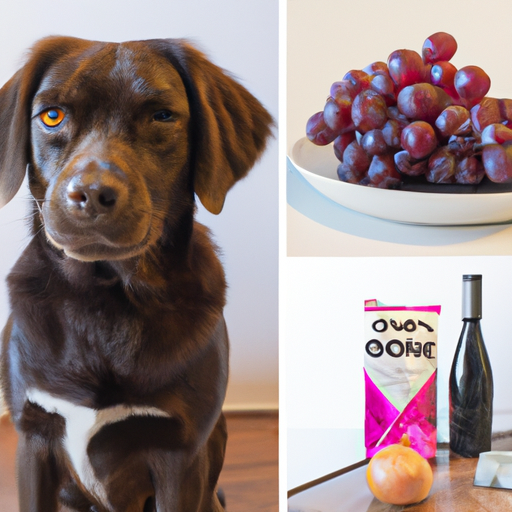As a caregiver, you strive to provide the best care possible for your furry friend. You understand the importance of a well-balanced diet, regular exercise and routine check-ups for your dog. However, did you know that some human foods can be toxic to dogs? In this article, we will explore eight common human foods that pose a risk to your pet’s health.
1. Chocolate
One of the most common foods that are toxic to dogs is chocolate. Chocolate contains theobromine, a stimulant that affects the nervous system and heart muscle.
- Dark chocolate and unsweetened baking chocolate have the highest levels of theobromine.
- Symptoms of chocolate poisoning include restlessness, increased urination, tremors, or even seizures.
| Type of Chocolate | Theobromine per oz |
|---|---|
| Milk Chocolate | 60mg |
| Dark Chocolate | 160mg |
| Baking Chocolate | 450mg |
2. Xylitol
Xylitol, a sweetener found in many sugar-free products, can cause insulin release in dogs, leading to liver failure.
- Xylitol is found in products like gum, candy, baked goods, and toothpaste.
- Signs of toxicity include vomiting, loss of coordination, and seizures.
3. Grapes and Raisins
While it’s not entirely clear why, grapes and raisins can cause kidney failure in dogs.
- Even a small amount can make a dog sick.
- Symptoms include vomiting, lethargy, and depression.
4. Onions and Garlic
Onions and garlic can kill red blood cells in dogs, leading to anemia.
- This is true for all forms of onions and garlic, including powdered, raw, cooked, or dehydrated.
- Symptoms can vary but may include weakness, vomiting, and breathlessness.
5. Caffeine
Caffeine is another stimulant that can be harmful to dogs.
- Coffee, tea, and energy drinks are common sources of caffeine.
- Symptoms of caffeine poisoning include restlessness, rapid breathing, heart palpitations, muscle tremors, and seizures.
6. Alcohol
Alcohol has the same effect on a dog’s liver and brain that it has on humans. But it takes a lot less to hurt your dog.
- Even a small amount of alcohol can lead to significant intoxication for a dog.
- Symptoms can range from weakness, slow breathing rate, to coma or even death.
7. Avocado
Avocados contain persin, a fungicidal toxin, which can cause serious health problems in dogs.
- The biggest risk is choking, as the avocado pit can easily get lodged in a dog’s throat, stomach, or intestines.
- If your dog has eaten avocado, watch for symptoms like vomiting, diarrhea, and lack of stool production.
8. Dairy Products
Dairy products can cause digestive problems in dogs as they have low levels of lactase, the enzyme that breaks down lactose.
- Symptoms include diarrhea, gas, and other digestive issues.
- While not immediately life-threatening, discomfort and possible dehydration are good reasons to avoid giving your dog dairy.
FAQs:
1. What should I do if my dog ingests a toxic food?
If you suspect your dog has eaten a toxic food, contact your vet immediately. They will likely ask for information on what and how much was consumed, and the weight of your dog.
2. Are there other human foods that can be toxic to dogs?
Yes, there are other foods and substances that can be toxic to dogs. For example, macadamia nuts, yeast dough, and certain artificial sweeteners like xylitol.
3. How can I prevent my dog from eating toxic foods?
Ensure foods are stored out of reach, and be mindful of what food is accessible during meal times. Educate family members, especially children, about the dangers of certain foods to pets.
Remember, the best way to prevent food poisoning in dogs is to only feed them dog-specific food and treats. Always consult with your vet if you are unsure about feeding your dog a certain food.



